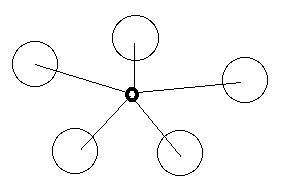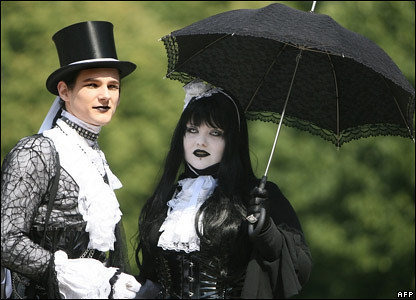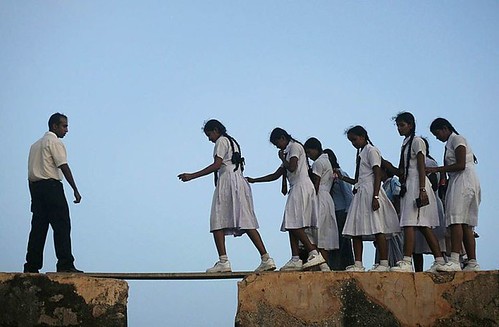Families are structured in differing ways and here I look at two varying structures and the psychological consequences of those structures on the child’s psychological development.
There are emeshed and distancing families. They can be diagrammed as such.
Emeshed family

Scary outside
Distancing family

These can be seen to be the extremes of the continuum with the ‘normal’ family existing in the middle. The closer the family is structured to represent the end points of the continuum the more maladaptive psychological consequences there will be for the child growing up in them.

Emeshed family
The diagram shows the family members represented by the circles. In this family there is a very clear boundary between the inside of the family and the outside and the member have a sense of closeness and belonging but overly so. There is a script belief by the family, “Don’t trust” others (outside the family). There can be paranoid beliefs about non family members. “Us and them” thinking. The world outside the family is seen as a scary and dangerous place and you can only trust family - is the ethos.
Group think creates self perpetuating beliefs. Along with the introjection of beliefs particularly about others. This can result in fighting with others out side the family. Neighbourly disputes over fences or barking dog. Family feuds use the group dynamics of the combat state which can foster a strong emeshed family structure.
There can be faulty thinking - grandiose delusions about the specialness of the family or one member may be identified a special due to what is believed to be exceptional ability (sport, music academic), appearance, power, wealth and so on.

Family gatherings such as birthdays, holidays, christmas and so forth occur regularly and non attendance is viewed in a very dim light. There can also be (but not always):
Infantilization of the children
Excessive contact - sleeping together, working together, socialising together
Prevention of independent behaviour
Parental - system control. Intolerant of variation or deviation of the members where members do not behave how they are supposed to. A child who refuses to eat dinner, performing poorly at school or a parent displaying anger, power being challenged. The response to correct deviations are swift and intense by other family members.
Distancing family
In this instance there are tenuous connections between family members and often there is no contact for long periods of time. There is little sense of belonging and the family being a close knit group with a clear sense of boundary between it and the rest of the world.
No sense of belonging or community leaves people feeling isolated. There can be one person who holds the family together and when they die or move away the family disintegrates. Don’t belong injunction.
Little interest or frequency of family gatherings. Can easily geographically move away from each other and there are long periods of little or no communication with few protests from anyone.
The distancing family tolerates variation and deviation to the extent of not even noticing or caring. Responses to variations may not even occur even when required such as with a truanting child.

Mixture
Mixture of family structures can occur at times if there is a number of people like in-laws cousins and so forth. One get subgroups in the family that can be structured like this.
Potential problems resulting form these structures
Emeshed
Relationship problems - Spinsters, bachelors & divorcees. Children may have a series of failed relationships that never work. No one is ever good enough for me or they all have some bad point that negates them as a potential partner. Maybe a short dysfunctional marriage may occur. A long term affair with a married man is another possibility (ie selecting an unavailable partner). When these relationship end where do they go then? Go back to the family of course.
This raises a point that I sometimes see in counselling with those who are entering a stage where marriage is in the foreground. When you marry someone you marry the individual person but you also marry their family structure all their attachments and relationships as well. The family structure and attachments were there long before the potential spouse came along and these things tend to be inert and do not readily change. Indeed in an emeshed family they are very resistant to change. If one is marrying into an emeshed family structure they better get used to the idea and it will take them a long time to be fully accepted into the family structure. Sometimes they never are and will always seen as an outsider to some extent.

Gothic wedding
This raises the issue of a person’s motivation for marrying a spouse. People get married for lots of reasons. The overt reason is because they have fallen in love with the partner and want to spend the rest of their life with him/her. Underneath there can be a whole variety of other covert psychological reasons.
People from an emeshed family can marry to get out and away. They see it as one of the few ways to get out of an oppressive family system especially when the newly weds geographically move away from the original family unit. The family will use all sorts of mechanisms to stop this happening such as financial ties, gifts, emotional black mail and so forth.
If you are marrying a person from a distancing family one may wish to consider such possible motives of their partner. It also works the other way. People from a distancing family can marry a person from a ‘closer’ family because they crave the feeling of belonging to a family. In their mind they are marrying the family attached to the partner just as much as they are marrying the partner, if not more so.
Other problems that can result from an emeshed family
School phobia
The child who is aggressive or unpopular to his peers ends up isolating self
Enuresis & encropesis = cannot stay away from home over night with out complications and embarrassment
Paruresis
Anxiety disorders - agoraphobia, panic attacks, means of travel such as a fear of flying or public transport. Any kind of anxiety that makes movement away from the home or family difficult can have some of its basis in the emeshed family structure. It should be noted that there are also other causes of these problems. However if a client presents with this kind of problem then the counsellor needs to investigate the type of family structure the person grew up in.

“Leaving home” problems are typical of the emeshed family. When the children reach the age where they are ready to (supposed to) leave the home and family. Twenty somethings or thirty somethings. When the family reaches this developmental stage it can restructure it self to make one or more of the children an identified patient. The young adult develops a problem like a drug problem, becomes suicidal, develops a mental illness of some kind, or something else like anorexia or other kinds of eating disorders.
When this happens the family bonds together for the good of the identified patient when the real reason underneath is to propagate the emeshment.
Distancing
The schizoid personality type is the most obvious product of this type of family structure. There may be a sense of despair due to lack of emotional attachment, commitment phobia and difficulty with forming close attachments. The ‘gypsies’ of the world who can travel and never really settle down into some kind of group or family unit. At times some find drugs can fill the void of the lack of attachment.
The anti social or narcissistic personalities can also manifest from this kind of background. Both these have attachment difficulties and either don’t understand what attachment is or simply find human attachment too overwhelming.
As mentioned before sometimes these people can attempt to solve their distress by marrying a family. The man may actually be attracted to and in love with the woman's family more so than her. This may lead to marital problems later on.
Graffiti
I think I come from home that's deviated towards 'distancing' on your map, and my wife's family towards 'emeshed' pole.
ReplyDeleteHowever, I object to the opinion that I would be looking for closer bonds, attatchment or sth like this in her family. Well, maybe I am not completely happy with the point I am now w/ my parents but I prefer that to this - strange to me - involvement she's in.
To me, in terms of TA, the 'distancing' families transact mostly in A2A mode whereas the 'emeshed' have a lot P2C and vice versa transactions going on.
So, as Horace Walpole once said "Life is a tragedy for those who feel, but a comedy to those who think" (we could try mapping these categories to your family bonds model) - and I spent so much time on 'thinking' that fell short of 'feeling' at some point.
Wow Tony! There's a whole lot involved isn't there?
ReplyDeleteYes Roses, there is a large amount involved in families and this is just one perspective on the topic
ReplyDeleteTony
Hello Zbig,
ReplyDeleteThe point I was trying to make in relation to your comment is that people from a distancing family can go either way. The young child may develop a yearning for family and thus seek to 'marry' one. Others will decide attachments are just too overwhelming and spend adulthood avoiding them so they would never set out to marry a family.
yes those from a distancing family will tend to keep their relationships emotionally distant and thus mainly have A2A transactions rather than the more emotionally charged transactions of P2C or C2C.
Tony
Tony,
ReplyDeleteInteresting post and it raises some questions. Do you think a person is permanently branded in some way because he/she grew up in a distancing or emeshed family? For example, if he/she grew up in a distancing family and recognized he/she didn't like socializing and didn't get attached to people, is there anything that can change that? If parents come from two ends of the spectrum and have children (assuming they can stay together long enough), do you think the extremes will balance out so the family will function in the normal range regarding how the children will turn out?
Yes KYLady,
ReplyDeleteIt is possible to do something to change that. This what I do most days i work - assist people to alter their attachment styles. Some times it is easier to than at other times.
In relation to the second part of your comment each family will have its own culture which primarlity is established by the parents. If father is distant then mother can still create an emeshed culture with the rest of the family. Indeed this does happen when father is by and large not there much and the rest of the family functions without him and that could be in an emeshed way.
Tony
Yes, I liked this post. The comment I was going to write, was clarified in your comments when you said someone from a distancing family can swing both ways, so to speak, lol! Though I dont understand why someone from a distancing family would want to marry into an emeshed one, because surely that would be just too overwhelming.
ReplyDeleteHello Kahless,
ReplyDeleteI don't know why but it certainly does happen. They develop a craving for family relationships they see others have which they don't have.
Have a think about other families you may know which have good relationships you didn't have. Do you have any desire to have such relationships?
Take care
Tony
Kahless,
ReplyDeleteMy family was quite the distancing type. I met my husband early in my freshman year of college fell in love with his family long before I fell in love with him. Like Tony commented, it seemed like I'd stepped into a TV show. These people ate dinner together, had birthday parties with presents, and called each other for no reason. When we divorced, leaving his family was much harder than leaving him.
Thanks for you comment Anon,
ReplyDeleteIt seems you had the exact experience that I was describing in my post. It would be great to have you as a case study that I can use in workshops or some formal writing I may do on the topic at some point in the future.
If you could simply elaborate and go into more detail on what you have said. Doesn't need to be long and of course it would only ever be used anonymously!
If you agree then you could either email it to me or post it here and give me permission to use it. I could even have some comments to make on it depending on what you say.
thanks
Tony
Gee Tony, I'm flattered! Of course you may use anything I type here - it's your blog and I'm anonymous.
ReplyDeleteMore detail...where to begin? We had only dated a month or so before he insisted I meet his family, and a very large family at that! Six kids in his family, with five of them very close to my age. I no more than walked in the front door and his mother hugged me (I wanted to run away at that moment!) The whole family was there for dinner, including some aunts and his grandmother. It was quite overwhelming - they all came to meet me and we all sat down to dinner like it was no big deal...like they'd done it a million times before.
His family and his circumstances were very different from mine. Even before we were married, I felt much closer to his family than I was to my own. We stayed married for 7 years, but I would have left much sooner if it weren't for his family. I didn't want to leave them.
Thanks for that anon, I will probably have a couple of questions for you later if you are willing to answer them
ReplyDeleteRegards
Tony
No Tony, no desires.
ReplyDeleteA few years ago, I was doing something work related in the evening and one of my team invited me home for tea with her family, as we had a few hours to kill and she lived nearby work. I remember the meal with fondness, as I was fascinated to watch how the family interacted with eachother and thought to myself how wonderful they were with eachother. Definately a good and healthy family dynamic. But I had no cravings.
Mrs K has no family relationships and I am pretty pleased not to have to deal with in laws to be honest.
People are a hassle in general. If you read that psych profile I sent you, you would have seen I scored low on 'like people' (lol!) I dont dislike people but I cant in general be bothered with the time you have to invest in people. Relationships are high maintenance and I dont have the energy.
By the way, in your original post you mentioned the 'dont belong' injunction. I hadn't heard of that one (or I forgot it) and I did think to myself that I dont really belong anywhere.
C'est la vie.
Cheers
K.
Hi Anon,
ReplyDeleteThank-you for your comment. I must say I feel somewhat un-nerved you are anon. Usually I can tell who people are by their style of writing if one day they go anon. But I dont think I know you.
So do you mind a nick-name? I don't need to know who you are really, just a tag name as it helps me 'see' people. It helps me in my mind. What should I call you?
I go by 3 different names in Cyber space btw, lol!
Kahless.
Kahless,
ReplyDeleteSo sorry to unnerve you; it was not my intent. I like being anonymous.
A,
ReplyDeleteWell maybe using the word "unnerve" was a bit dramatic of me. I get anonymous cos I sure as hell am! Well, not fully as half the people here know who I am really, but no-one in real life would have me pitched as Kahless.
Boy I am rambling. And Tony, I have had no sherbets tonight in case you were wondering.
K.
Hello Kahless,
ReplyDeleteNo Sherbets tonight?
I suppose not polecats were then spotted either.
Graffiti
Thanks Anon,
ReplyDeleteWhat did it feel like to be raised in a distancing family?
Did you realize something was missing (like what you found in your husbands family)?
Tony
Tony,
ReplyDeleteThose are some hard questions to answer. I knew my family was not typical before starting kindergarten, but I don’t remember ever thinking something was missing – it was just how things were and how things had always been. My husband and I dated four years before we married, so I got to know his family very well because we visited with them frequently. They were (and still are) such nice people, and his parents treated me just like I was one of their kids, even before we were married!
You asked what it felt like to grow up in a distancing family. The only word that comes to mind is...desolate.